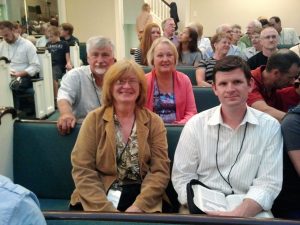Therefore, when Christ came into the world, he said: “Sacrifice and offering you did not desire, but a body you prepared for me; with burnt offerings and sin offerings you were not pleased. Then I said, ‘Here I am—it is written about me in the scroll—I have come to do your will, my God’” (Hebrews 10:5-7 NIV).
Our second text makes known why the Messiah came in relation to the story of God’s glory. God chose to work out his plan through a series of covenants. There are five covenants clearly identified in the Holy Writings, and they are usually linked to major characters in God’s plan. So we speak of covenants associated with Noah, Abraham, Moses, David, and Christ. The covenant with Abraham is called the holy covenant (Luke 1:72) or the promise (Galatians 3). The covenant with Moses is called the law or the old covenant in many places; it is also called the first covenant (Hebrews 8:7; 9:1). It is important to keep this last designation in mind in order to understand Hebrews ten properly. The covenant of which Christ is the substance (Isaiah 42:6; 49:8) is usually called the new covenant, though in Hebrews it is also called the better or the second covenant (8:7 CSB, ESV, NLT). Now let’s focus on this second reason for Christ’s first coming.
The Messiah said, I have come to do your will, my God. Now surely he always pleased God the Father. When you read the Gospel of John carefully, you learn that all his works and words were exactly what the Father desired. When he did signs and wonders, each one was the will of the Father. When he spoke, he spoke what the Father told him to speak. How he acted was to reveal the Father to us (John 1:18). If we read this text through the lens of systematic or practical theology, we will think that this phrase is speaking of our Lord’s general obedience to the Father, and how he is our pattern to do the same. Certainly, there is nothing wrong with either systematic or practical theology, but we must not allow them to interfere with a proper understanding of any Biblical text. What is the will of God that Christ came to do?
First, in the above verses, notice the contrasts between sacrifice and offering with the body God prepared for the Messiah, and between offerings that could not please God and doing God’s will. Weren’t sacrifices and offerings established by God (see especially Leviticus) and so his will? Yes, they were! But they could not please God in the sense of being able to take away sin and cleanse the consciences of those who sinned. The Messiah had to come to provide a better sacrifice for sins, the offering of himself.
Second, notice what the writer of Hebrews said about the old covenant. The law is only a shadow of the good things that are coming—not the realities themselves. For this reason it can never, by the same sacrifices repeated endlessly year after year, make perfect those who draw near to worship (10:1 NIV). It was a shadow and its sacrifices can never… make perfect those who draw near to worship. Now a shadow is good for the purpose for which God made shadows. They show us that something of substance is nearby. But that does not make the shadow better than the substance. And when we have the substance, we no longer need the shadow. For example, my shadow might show my wife that I am walking toward her. So she is alert to my presence. But I don’t want her to kiss my shadow; I want her to kiss me!
There are too many Christians in our time that are in love with the shadows of the law covenant. Such shadows proclaimed that the Lord was near his old covenant people. So then, the law is holy, and the commandment is holy, righteous, and good (Romans 7:12 NIV). But now that Christ, who is the better covenant, has come and accomplished redemption, we no longer need the shadows of the law, because Christ is now in us.
Third, Christ came to fulfill the law, set it aside because it was fulfilled, and to establish the new covenant. Then he said, “Here I am, I have come to do your will.” He sets aside the first to establish the second. And by that will, we have been made holy through the sacrifice of the body of Jesus Christ once for all (Hebrew 10:9-10 NIV). Notice what the Spirit caused to be written. He sets aside the first to establish the second. The first is the law or old covenant and the second is the new or better covenant. We are no longer under the law, written on stone tablets and given to Israel on Sinai. We are in Christ, and the Spirit of Christ who lives in us is our leader in following Christ, our Lord and Savior.
Grace and peace, David

 Philippians 2:1-2a
Philippians 2:1-2a 2 Timothy 2:22
2 Timothy 2:22 Romans 8:9-10
Romans 8:9-10

 Philemon 1:7
Philemon 1:7 1 Timothy 5:1-2
1 Timothy 5:1-2 1 Timothy 3:14-15a
1 Timothy 3:14-15a